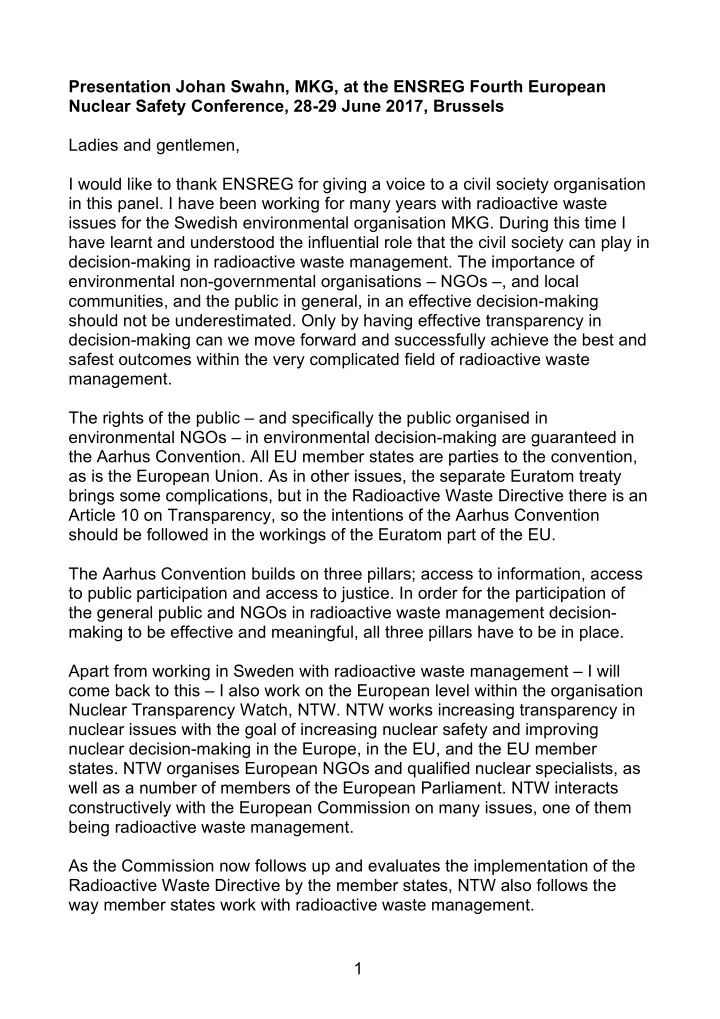

Presentation Johan Swahn, MKG, at the ENSREG Fourth European Nuclear Safety Conference, 28-29 June 2017, Brussels Ladies and gentlemen, I would like to thank ENSREG for giving a voice to a civil society organisation in this panel. I have been working for many years with radioactive waste issues for the Swedish environmental organisation MKG. During this time I have learnt and understood the influential role that the civil society can play in decision-making in radioactive waste management. The importance of environmental non-governmental organisations – NGOs –, and local communities, and the public in general, in an effective decision-making should not be underestimated. Only by having effective transparency in decision-making can we move forward and successfully achieve the best and safest outcomes within the very complicated field of radioactive waste management. The rights of the public – and specifically the public organised in environmental NGOs – in environmental decision-making are guaranteed in the Aarhus Convention. All EU member states are parties to the convention, as is the European Union. As in other issues, the separate Euratom treaty brings some complications, but in the Radioactive Waste Directive there is an Article 10 on Transparency, so the intentions of the Aarhus Convention should be followed in the workings of the Euratom part of the EU. The Aarhus Convention builds on three pillars; access to information, access to public participation and access to justice. In order for the participation of the general public and NGOs in radioactive waste management decision- making to be effective and meaningful, all three pillars have to be in place. Apart from working in Sweden with radioactive waste management – I will come back to this – I also work on the European level within the organisation Nuclear Transparency Watch, NTW. NTW works increasing transparency in nuclear issues with the goal of increasing nuclear safety and improving nuclear decision-making in the Europe, in the EU, and the EU member states. NTW organises European NGOs and qualified nuclear specialists, as well as a number of members of the European Parliament. NTW interacts constructively with the European Commission on many issues, one of them being radioactive waste management. As the Commission now follows up and evaluates the implementation of the Radioactive Waste Directive by the member states, NTW also follows the way member states work with radioactive waste management. 1
Implementation of effective transparency in decision-making is only one issue. The safety and economics of radioactive waste management has many challenges, as we will discuss today. I can also report that during the past several years environmental NGOs and their qualified experts have been given the possibility to participate in the European research on radioactive waste management. In the spirit of the Aarhus Convention. As European research support moves over to a European Joint Programming in radioactive waste management civil society will play a role. I have stated that effective transparency is important for successful decision- making in radioactive waste management. All three pillars of the Aarhus Convention have to be implemented. In addition the civil society has to be resourced in a way that preserves the independence of local communities and environmental NGOs. The Aarhus Convention is implemented relatively well in Sweden, especially since the nuclear legislation was complemented with a separate environmental legislation in the late 1990s. Access to information to official documents is a very old tradition in Sweden. The openness was a way to avoid corruption but it also serves well in allowing civil society access to information to allow open decision-making. Access to public participation in the form of early consultation is part of the nuclear and environmental laws and the Swedish Government early decided to allow both local communities engaged in siting as well as environmental NGOs to receive funding from the nuclear waste fund. The possibility for civil society to participate effectively in consultation processes, especially for the planned repository for spent fuel in Forsmark in Östhammar community, was seen as a way to improve the quality of the discourse. Much time was spent on consultations for the planned spent fuel repository in Forsmark. Then, since 2011, much time has been spent of the review of the application, both by the Swedish regulator and in the Swedish Environmental Court. And access to justice of communities and NGOs is part of the system. In Sweden environmental NGOs have the specific right to appeal legal decisions on environmental issues. We have not come to that yet. In September and October the review process of the application to build the spent fuel repository in Forsmark will move to the end with oral deliberations in the Environmental Court. Many things will be discussed; safety related issues such as copper corrosion and risks for 2
intrusion; alternatives to the KBS method such as deep boreholes; the question of whether Forsmark is a suitable site; and many other issues. After the court proceedings the court as well as the regulator will give their opinions to the Government. The Government will ask the opinion of the local communities involved. The community of Östhammar, where Forsmark is situated, will have a referendum on the issue in March. We can expect a first Government decision on the repository in 2019 as there are parliamentary elections in September 2018. And then the decision-making will continue for a number of years in the Swedish courts. I estimate that a final permit to build the repository, if it is given, will come in the early 2020s. Nuclear decision-making in Sweden is complicated but it also ensures that no stone is left unturned in the decision-making process. I finish by noting that at this meeting there a number of environmental NGOs ready to participate in the discussions. They are very well worth listening to. And engaging constructively with in decision-making. To get the best and safest outcomes within the very complicated field of radioactive waste management. Thank you for your attention! 3
Recommend
More recommend